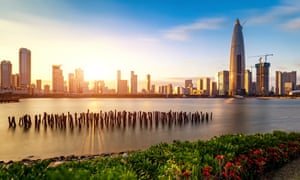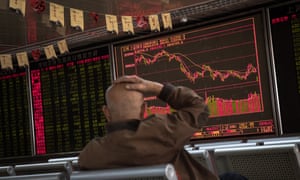
Stock markets have taken fright over a number of warning signs from key economies, the latest this week being the inversion of the US bond yield curve and news of a contraction in the German economy. Here is a guide to the trouble spots in the global economy that are rattling investors.
The US
The US is at the centre of the global stock market sell-off, with investors overlooking the fact that the US is expected by the International Monetary Fund to be the fastest growing of the G7 economies this year – at 2.6% – and has not enjoyed a lower unemployment rate since Neil Armstrong set foot on the moon in 1969. Instead, Wall Street fears that higher interest rates from the US central bank, the fading impact of tax cuts, and the trade war with China, are pushing the economy into recession.
The UK
Britain’s inclusion in the list of problem countries comes down to one word – Brexit. The economy contracted by 0.2% in the second quarter as stockpiles of goods, accumulated in the run-up to the original EU departure date of 29 March, were run down. Strong employment growth and rising real wagesshould be enough to produce a growth revival in the third quarter but a no-deal Brext on 31 October could have a marked impact on the UK, EU and rest of the world.
Germany
Europe’s most prolific exporter has found demand for its machine tools, trucks and cars has declined sharply over the past year, especially from China. The slump in exports sent GDP into reverse in the second quarter, declining 0.1%. A measure of business confidence fell so dramatically that last month it hit its lowest level since the 2008 financial crash. That said, the government has plenty of money to spend after a decade of budget surpluses, and businesses are carrying little debt, so have strength to weather any storm.
China
Officially China is growing at more than 6% a year but the reality is more grim than the headline numbers suggest. The country’s president, Xi Jinping, is trying to shift China towards slower but higher-quality growth, a process that is complicated by the vulnerability of Chinese companies and banks to tighter credit conditions and the impact of Donald Trump’s tariffs, which are leading to weaker factory output and a slowdown in exports. China announced this week that industrial production had hit a 17-year low in July.

Brazil
The domestic side of Brazil’s economy looks reasonably robust but that has not prevented shares and the currency from coming under severe pressure. Latin America’s biggest economy is getting the backwash from problems elsewhere in the world: its close neighbour Argentina is in financial meltdown, slower growth in China means a reduction in demand for Brazil’s abundant raw materials, and there are concerns that exporting to the US will also be choked off by a slowdown in the world’s largest economy.
Argentina
The return to political prominence of Cristina Fernández de Kirchner, the controversial former leftwing president of Argentina, has sent investors running for the hills. A pre-election poll put her and her running mate, the populist candidate Alberto Fernández, on course to beat the incumbent, president, Mauricio Macri, who has struggled to bring some order to the country’s finances. The government has borrowed heavily in the recent past and squandered most of the money on vanity projects and subsidies for crucial voter groups. Fernández and Kirchner are not being given the benefit of the doubt by investors. A sell sign over the country is already in place on the basis that, should the pair take power, the country will certainly default on its sovereign debt.
Italy
A recovery in 2017 proved to be brief, once Rome picked a fight with Brussels over the national budget that sent business confidence sliding. Threats of pulling out of the euro and possibly the European Union altogether may have faded from the rhetoric deployed by Matteo Salvini, leader of the League party, which heads the polls, but business confidence remains on the rack. A banking sector dragged down by bad debts, and a corporate sector that competes and loses with Chinese rivals, are likely to make for a prolonged period of decline.
Singapore
Singapore’s economy has been tipped to enter recession in the third quarter of 2019. The finger of blame is pointed at the US-China trade war, which continues to rock the south-east Asian nation after second-quarter growth was confirmed this week at -3.3%. The city state of 5.5 million people is a financial centre that hosts hundreds of billions of dollars in foreign savings and is considered a bellwether for the region. So it was a shock for investors that it could easily be knocked off its stride by declining sales of manufactured goods to China. A decline in Chinese tourists also depressed wholesale and retail trade.
[“source=theguardian”]




